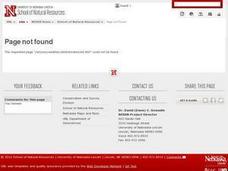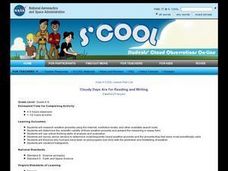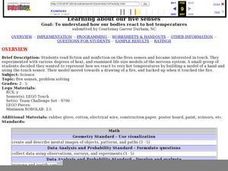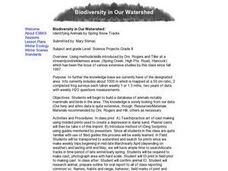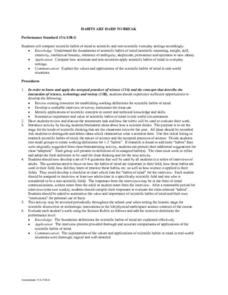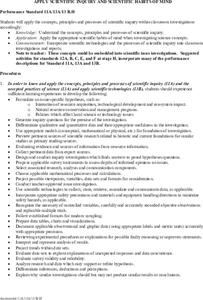Curated OER
Global Water
Students collect data on their household water use and calculate how many gallons of water a person uses per day. They investigate how students in different parts of the world get their drinking water.
Curated OER
Am I Hot or Am I Cold?
Students practice using a thermometer to determine how the air around the earth gets heated and cooled by the sun. Students chart the daily inside and outside temperature for two weeks.
Curated OER
Soil Formation...It's a Dirty Job
Students create a HyperStudio program about soil formation in their own area. They develop a list of the steps it takes to turn bedrock and organic material into soil, and create and present their HyperStudio stack to the class.
Curated OER
Researching Intermountain West Earthquakes
Young scholars research earthquakes using the internet and newspapers. They discover the earthquake's effect on people and buildings. They report their findings to the class.
Curated OER
Ready to Erupt!
Students observe a visual representation of a volcano erupting. They measure and sketch the volcano and discuss how engineers use this information. They discover the type of equipment used to indicate an eruption.
Curated OER
Web Research Helps Students Choose Classroom Pets
Learners interview different teachers in their school. They decide which pet would fit best in each classroom. They share the information they gathered with the class.
Curated OER
Trash Count
Students identify pollution around their local community. They discuss the sources of polution and categorize objects based on their properties. They discover ways to make changes to the environment and how to inform the public.
Curated OER
What is a Cloud
Third graders study clouds and how they are formed. They write acrostic poems about clouds and analyze and graph temperature data collected during varying degrees of cloud cover.
Curated OER
Cloudy Days Are for Reading and Writing
Learners consider a variety of well-known proverbs that refer to the weather. They research the scientific validity of these proverbs, conduct interviews about public perception of the proverbs and summarize their findings in writing.
Curated OER
Fire Wars
Students identify fire risk factors for a property located near a wildland area. Students discuss ecosystems subject to wildland fire and consider what could be done to eliminate the problem.
Curated OER
Design your own Water Temperature Experiment
Students use Robolab sensors and software to design an experiment that incorporates the use of temperature probes. They conduct the experiment, complete a lab sheet, evaluate the results and then consider if their hypothesis requires...
Curated OER
Measuring Water Temperature
Students measure the temperature of three water sources. They collect data points every second for twenty five seconds for each sample using Lego Robolab temperature sensors, complete a worksheet, and analyze the data.
Curated OER
Learning About Our Five Senses
Students study the sense of touch and various degrees of heat. They design a model that displays how the human hand reacts to heat using a touch sensor.
Curated OER
Biodiversity in Our Watershed
Eighth graders create a database of animals and birds in the area in which they live. They use molded prints to make a cast of an imprint from a specific animal. They identify and research animals and prepare an outline for an oral...
Curated OER
Measurement: Using the balance
Students use a balance and gram cubes to measure several different objects. They then record their results on a data chart and answer questions about them.
Curated OER
Hey, Look Me Over!
Students make observations about mealworms using hand lenses, rulers, and cotton swabs. Students complete their own mealworm observation chart, then they share their observations with the class. This is one station out of five in an...
Curated OER
Do You See What I See?
Students hypothesize the role of rocks, soil, and water by observing a terrarium and create a model to explore the water cycle. This is part of a five station set up.
Curated OER
Up, Up, and Away
Students create a model to explore the water cycle. Students also perform different experiments to witness water changing from a liquid to a gas. Students are asked to if they can find ways for water to go away without pouring the...
Curated OER
Insect Classification
Students compare and contrast the visible structures of three insects based on photographs. They differentiate characteristics of crane flies, ants, and wasps then create a simple classification system.
Curated OER
Dishing the Dirt Part 1
Students create a soil center on their school grounds. They begin to write in their science journals. They participate in an experiment that helps the community begin their own gardens.
Curated OER
In Your Own Backyard
Students observe organisms in their habitat and record their observations. They then draw conclusions about the organism's habitat needs and food sources.
Curated OER
Habits Are Hard to Break
Studens brainstorm ideas about the ways scientists think. In small groups, studentds create a definition for one or two "habits." Students develop a set of questions to be used by the entire class in a series of interviews. Students...
Curated OER
Apply Scientific Inquiry and Scientific Habits of Mind
Students review the components of the scientific inquiry method. In groups, they develop hypothesis on the issue given to them by their teacher and inquiry questions. They state the data in terms of qualitative and quantitative data. ...
Curated OER
Groundwater Realities
Students review the components of the scientific inquiry method. In groups, they use the internet to research the sustainability of water resources in their community. They examine an environmental impact study, answer questions and...
Other popular searches
- Health and Fitness Surveys
- Surveys and Bar Graphs
- Surveys of Favorite Foods
- Mean Median Mode Surveys
- Designing Surveys
- Opinion Surveys
- Data Tables Surveys
- Surveys and Sampling
- Surveys and Graphs
- Interest Surveys
- Writing Surveys
- Land Surveys



